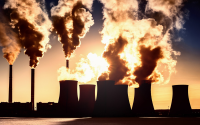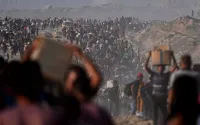9 December 2009
COPENHAGEN
www.commondreams.org/headline/2009/12/09-1
A Danish draft proposal for a political agreement "threatens the success" of UN climate talks in Copenhagen, the head of the G77 group of countries said Tuesday at the summit aimed at sealing a historic deal on cutting carbon emissions.
The text, which has not been officially released, is a "serious violation that threatens the success of the Copenhagen negotiating process," said Sudan's Lumumba Stanislas Dia Ping, who heads the G77 group.
"The G77 members will not walk out of this negotiation at this late hour because we can't afford a failure in Copenhagen," he told journalists.
"However, we will not sign an unequitable deal. We can't accept a deal that condemns 80 percent of the world population to further suffering and injustice," he added.
The propo saltext, called a "draft political agreement", created an uproar on the second day of the December 7-18 talks when an early draft dated November 27 circulated informally.
Earlier, UN chief Ban Ki-moon said he expected the summit to produce a deal on cutting carbon emissions as scientists reported that the first decade of the 21st century had bust records for global warming.
"I am encouraged and I am optimistic," Ban said, reflecting the weight of expectation resting on the 12-day negotiations.
"I expect a robust agreement in Copenhagen that will be effective immediately and include specific recommendations."
Prospects of a breakthrough were bolstered late Monday when the United States declared it would start to regulate carbon dioxide, the principal greenhouse gas, as a dangerous pollutant.
But the cost of failure in the Danish capital was highlighted when the World Meteorological Organisation (WMO) said the Noughties were shaping up to be the hottest since records began.
"The decade 2000-2009 is very likely to be the warmest on record, warmer than the 1990s, which were in turn warmer than the 1980s," Michel Jarraud, the WMO's secretary general, told a press conference.
Jarraud also said the year 2009 would probably rank as the fifth warmest since accurate records began in 1850.
The December 7-18 talks, under the banner of the UN Framework Convention on Climate Change (UNFCCC), are the boldest attempt in a 17-year odyssey to turn back the threat of climate change through consensus.
If all goes well, the conference will yield an outline agreement that sets down pledges by major emitters of greenhouse gases to curb pollution.
It will also set down principles of long-term financing to help wean poor countries off high-carbon technology and beef up their defences against climate change.
Rich countries are under pressure to kick in 10 billion dollars a year in "fast-track" funding from 2010 to 2012.
Further negotiations would be needed over the next year to flesh out the agreement. Once ratified, the accord would take effect from 2013.
Delegates said the next few days would see countries lay out their positions before some 110 world leaders -- including US President Barack Obama, Premier Wen Jiabao of China and Indian Prime Minister Manmohan Singh -- arrive for the climax.
Two years of talks have taken place in the run-up to Copenhagen, exposing deep rifts on emissions burden-sharing.
Reducing greenhouse gases carries an economic cost in energy efficiency and in shifting away from the oil, gas and coal, the cheap and plentiful "fossil fuels" that are the mainstay of the world's power.
Developing countries, several of which are already big polluters, are refusing to budge unless rich nations slash their emissions by at least 40 percent by 2020 over 1990.
Among advanced economies, eyes have turned to the United States, which remained on the sidelines of the climate arena under George W. Bush.
Obama is now bulldozing away Bush's policies and is steering legislation through Congress that would cut US emissions by four percent by 2020 compared to the 1990 benchmark -- albeit still a fraction of what the EU is demanding.






